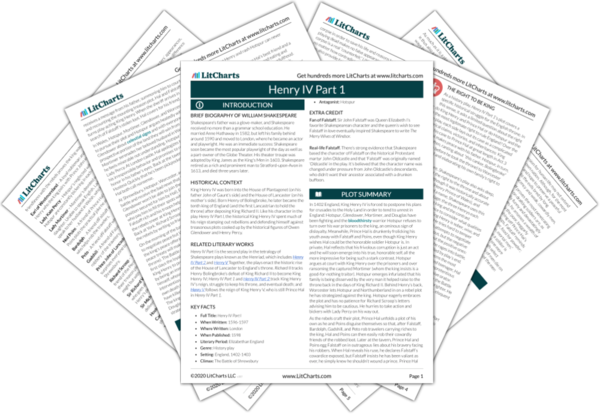Summary
Analysis
In another part of the battlefield, King Henry, Prince Hal, Prince John, and Westmoreland discuss battle strategy. Hal is wounded and King Henry wants him to take a break from fighting, but Hal refuses. Prince John leads Westmoreland out into the fray again and, alone on stage, Hal and his father marvel at how surprisingly brave and honorable Prince John has proved himself to be. Hal exits.
King Henry continues to demonstrate his intelligent, strategic approach to the battlefield. Prince John, a minor and totally absent character until now, gets attention by proving himself to be an honorably courageous warrior.
Themes
Douglas enters and asks King Henry whether he is yet another fake king. King Henry says he’s sorry that his loyal decoys have been killed. Swearing he is the real king, King Henry prepares to fight Douglas, who still believes the king is just another decoy, albeit one whose posture is particularly kingly.
King Henry is wounded fighting Douglas and Prince Hal re-enters to help defend his father, driving Douglas offstage. Alone on stage, King Henry tells Hal he has redeemed himself in his father’s eyes by proving that he loves his father after all. Prince Hal laments that King Henry ever believed otherwise. King Henry exits.
Prince Hal’s actions on the battlefield have fulfilled the promises he spoke to his father and won honor and respect in the king’s eyes.
Themes
Hotspur enters and confronts Prince Hal, who tells Hotspur that England isn’t big enough for the two Harrys and prepares to fight. Hotspur sarcastically exclaims that he wishes Hal’s “name in arms were now as great as mine!” Hal promises that all of Hotspur’s “budding honors” will soon belong to him. They fight. Falstaff enters and cheers Hal on. Douglas enters and fights Falstaff until Falstaff falls. Douglas exits.
Prince Hal and Hotspur’s fight marks the climax of the play. Hotspur remains cocky and proud as ever, certain of his own honor and victory at Hal’s expense.
Themes
Get the entire Henry IV Part 1 LitChart as a printable PDF.

Hotspur falls, wounded, and declares to Prince Hal that his loss of noble honor “wound[s] my thoughts worse than thy sword my flesh.” He dies. Prince Hal muses over Hotspur’s corpse, thinking how small it looks compared to the huge ambitions of Hotspur’s life. He praises Hotspur and treats his corpse respectfully, thinking that “even in [Hotspur’s] behalf, I’ll thank myself for doing these fair rites of tenderness.”
Hotspur’s dying words demonstrate his life’s dilemma: his obsession with glory blinded him to practical matters and, caring only about honor, his disregard for physical safety led him to his death. Prince Hal shows himself to be an admirably humane warrior, treating Hotspur’s corpse with respect.
Themes
Literary Devices
Prince Hal notices Falstaff’s corpse and laments his friend’s death, saying that he “could have better spared a better man” and that he will miss Falstaff deeply. Hal exits.
Falstaff is indeed not the “better” man many of the noble, honorable soldiers are, but Prince Hal loves him dearly.
Themes
Alone on stage, Falstaff rises and declares that he faked his death in order to escape being killed by Douglas. But the real fakers, he reflects, are those who don’t play dead for “to die, is to be a counterfeit; for he is but the counterfeit of a man who hath not the life of a man: but to counterfeit dying, when a man thereby liveth, is to be no counterfeit, but the true and perfect image of life indeed.” As for courage, he concludes that “the better part of valor is discretion; in the which better part I have saved my life.”
In another prodigious play on appearances, Falstaff reveals that he was only pretending to be dead. As always, his agile language is able to twist conventional truth into something else entirely: he is, his argument proves, neither a faker nor a coward, for he would only be “counterfeit” if dead and only cowardly if he hadn’t saved his own life.
Themes
Noticing Hotspur on the ground, Falstaff is frightened, and stabs the body to make sure Hotspur is really dead. Satisfied, Falstaff slings Hotspur’s corpse over his shoulder, preparing to tell everyone that he killed Hotspur himself.
Ever the opportunist, Falstaff sees another chance to affect an impressive appearance of courage and doesn’t hesitate to do so.
Themes
Prince Hal and Prince John enter. At first they’re shocked to see Falstaff standing and think he might be a ghost. But, hearing Falstaff speak, the princes realize it is truly him. Falstaff brandishes the corpse on his shoulder, telling the princes he has killed Hotspur. When Hal balks at the story, Falstaff swears on his life that he himself delivered Hotspur’s fatal blow. Hal warmly tells Falstaff to bear the corpse “nobly” and says he’s happy to go along with his friend’s story “if a lie may do thee grace.”
Falstaff’s false appearance of death was convincing enough that the princes worry he is still dead. Falstaff identifies his true, live self through his unmistakable speech. Hal’s merry willingness to go along with Falstaff’s absurd ploy is touching because it indicates that he cares more about friendship than about personal honor and glory, though it is important to note that Hal will make a different choice at the end of Henry IV Part Two.
Themes
Trumpets sound the rebels retreat and Prince Hal and Prince John exit to go see how many of their soldiers are still living. Falstaff follows them, saying that, if he is rewarded for Hotspur’s corpse, he’ll lose weight, give up drinking, and “live cleanly as a nobleman should do.”
Falstaff’s promise links appearances and essences—his rotund drunkenness, he suggests, corresponds to his corruption and, were he to become a morally upright person, he would also become thin and sober.
Themes












